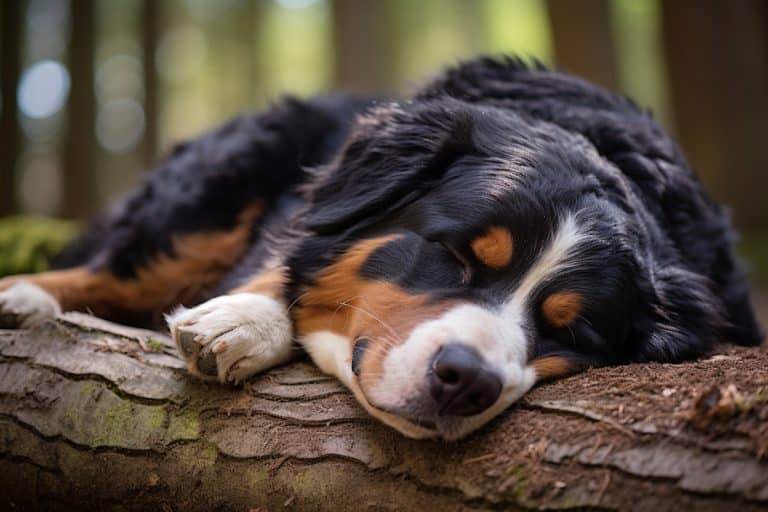The Bernese Mountain Dog is a gentle giant from the farmlands of Switzerland. Known for its friendly nature, striking tri-colored coat, and a tendency to form strong bonds with its family, this dog breed is a popular choice among dog lovers. Being a large breed with a lot of energy, sleep plays a crucial role in keeping them healthy and happy. In this exploration, you’ll discover the importance of sleep for Bernese Mountain Dogs, understand their sleep patterns, and find out how to ensure they get the rest they need.
Understanding Dogs’ Sleep Patterns
Dogs, just like people, need sleep to rest and recharge. However, their sleep patterns are quite different from ours. While humans typically sleep in long, uninterrupted stretches, dogs have a more flexible sleep schedule. They take several short naps throughout the day and night. The amount of sleep a dog needs can be influenced by various factors including their age, health, and how active they are during the day.
Understanding how age and health impact the rest of your Bernese Mountain Dog is crucial to providing the best care for your furry friend. Let’s delve deeper into how these two factors influence their sleep.
The Impact of Age on Sleep
Just like with people, the age of your Bernese Mountain Dog can significantly influence their sleep patterns. Here’s how:
Puppyhood
Puppies are like little bundles of energy when awake, but they also sleep a lot to support their rapid growth and development. It’s not uncommon for Bernese Mountain Dog puppies to sleep up to 20 hours a day. This sleep helps them build their muscles, bones, and allows their nervous system to develop.
Adulthood
As your Bernese Mountain Dog reaches adulthood, their sleep patterns will change. An adult Bernese Mountain Dog generally needs about 12 to 14 hours of sleep a day. They have a moderate energy level and require a good amount of exercise to keep them healthy and to ensure they sleep well.
Senior Dogs
As dogs age, they tend to sleep more. Their energy levels may decrease, and they might face health issues that can make them more tired. Senior Bernese Mountain Dogs might spend more time resting and sleeping compared to their younger counterparts.
How Health Affects Sleep
The health of your Bernese Mountain Dog is another critical factor influencing sleep. A healthy dog will have a regular sleep pattern, while a dog facing health challenges may sleep more or less than usual. Here are some points to consider:
Health Issues
Bernese Mountain Dogs are prone to certain health issues like hip and elbow dysplasia or arthritis, which can make sleeping uncomfortable. If they are in pain, they might have trouble finding a comfortable position to sleep or may wake up frequently during the night.
Exercise and Diet
Exercise and diet are key components of your dog’s overall health which, in turn, affects their sleep. A dog that gets regular exercise and eats a balanced diet is likely to have better sleep quality. Ensure that your Bernese Mountain Dog gets enough exercise and eats well to promote better sleep.
Regular Vet Checkups
Regular vet visits are essential to catch and address any health issues early. If you notice any changes in your dog’s sleep patterns, it’s a good idea to consult with your vet. They might be able to provide insight into what’s going on and suggest a plan to improve your dog’s sleep.
The Sleep Needs of a Bernese Mountain Dog
Bernese Mountain Dogs typically need around 12 to 14 hours of sleep every day. That might seem like a lot, but it’s perfectly normal for this breed. Their historical background as working dogs in Switzerland has shaped their sleep and activity levels.
How Work History Influences Sleep
Originally bred to help with farm work, Bernese Mountain Dogs have a moderate energy level. They were used to having active days with plenty of work to do which kept them busy and helped them to sleep well at night. Even though they might not have a job on a farm now, they still benefit from having regular exercise to help them sleep well.
Other Factors Influencing Sleep in Bernese Mountain Dogs
Aside from age and health, various other factors can influence the sleep patterns of your Bernese Mountain Dog. It’s essential to be aware of these factors to ensure your furry companion is getting the rest they need for a healthy, active life. Let’s explore these factors further.
Mental Stimulation
Along with physical exercise, mental stimulation is crucial. Engaging in activities that challenge your dog’s mind like puzzle toys, training sessions, or interactive play can tire them out and lead to better sleep.
Nutrient Intake
Ensure your dog’s diet is well-balanced with the right mix of proteins, fats, and carbohydrates. Also, it’s good to have a regular feeding schedule as it can help regulate their sleep patterns.
Water Intake
Proper hydration is crucial for overall health which in turn affects sleep. Ensure your dog has access to fresh water throughout the day.
Environment
The environment in which your Bernese Mountain Dog sleeps can significantly affect their sleep quality.
Comfortable Bedding
A comfortable, cozy bed in a quiet area can make a big difference in how well your dog sleeps. Ensure the bed is big enough for them to stretch out comfortably.
Temperature and Lighting
Bernese Mountain Dogs have thick coats, so they might prefer a cooler sleeping area. Also, keeping the sleeping area dim or dark can help signal to your dog that it’s time to sleep.
Noise Levels
A quiet environment is conducive to better sleep. Try to provide a peaceful, noise-free sleeping area for your dog.
Routine
Dogs thrive on routine. Having a consistent daily routine helps your dog know when it’s time to sleep, eat, or play. Try to keep a consistent schedule. This consistency can help regulate your dog’s sleep patterns and promote better sleep.
Conclusion
Sleep plays an integral role in the health and well-being of Bernese Mountain Dogs. By understanding their sleep needs and creating a favorable environment, you can help ensure your dog gets the rest it needs. Observing your dog’s sleep patterns and consulting with a vet for any concerns can help you and your Bernese Mountain Dog enjoy a happy, healthy life together.








